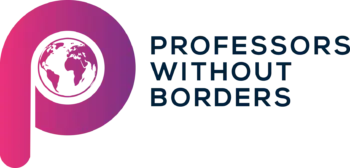Programmes
Since our inception we have reached more than 3,700 students in over 16 countries. These programmes last between three days and two weeks and run according to the LSE Summer School model. They consist of several short courses for students and workshops for faculty.
We operate programmes upon the invitation of a host university. We work closely with them to develop a subject-agnostic and skills-focused programme that suits and benefits their students and reflects the local context. Participants engage in real activity with real consequences for the purposes of meeting their learning objectives. Typically, our workshops are designed for about 25 participants. However, we ensure they are accessible to a broader audience, including the general public, students, faculty, and occasionally parents.
In this way we reach the heart of a small community.
Our Latest Programmes

University of Global Health Equity, Rwanda
At the University of Global Health Equity (UGHE), we aim to strengthen faculty capacity in online teaching, assessment, and AI integration in health education; equip students with practical, transferable skills to support their transition from university to health careers; and inspire participants to embrace innovation, technology, and lifelong learning as they contribute to Rwanda’s growing knowledge economy.
November 2025

Nari Sewa Samiti, India
At NSS we aim to introduce experiential and project-based learning strategies to faculty, fostering active learning, problem-solving, and creativity among adolescent learners. It seeks to strengthen early-years teaching practices through storytelling and diverse instructional resources that enhance engagement and motivation. The programme also aims to build young women’s confidence by developing emotional intelligence, self-awareness, and responsible independence. Additionally, it will enable teachers to effectively use AI and digital platforms, promoting inclusive, technology-enabled pedagogy. Finally, it supports teachers in designing authentic assessments with meaningful feedback and encourages reflective practices that nurture lifelong learning.
November 2025

Movement for Youth and Children’s Rights, Sierra Leone
Returning to Freetown, where our journey first began in 2016, Professors Without Borders delivered a programme for teachers from across Sierra Leone. Building on years of partnership, the workshops explored pedagogy, artificial intelligence, and innovative classroom practices designed for low tech and offline contexts. The sessions supported incredible educators who have continued their mission through political and economic hardship, from Ebola to COVID-19, sustaining learning against all odds. This programme celebrated their dedication and equipped them with tools to adapt, inspire, and shape the future of education in Sierra Leone.
October 2025

Ecolotrip, Senegal
In Thiès, a city still developing its infrastructure, young climate entrepreneurs joined a 48-hour Climathon dedicated to sustainable agriculture. The event explored practical ways to improve water management and reduce reliance on rainfall, issues deeply felt in local communities. We supported this work through a blend of virtual and in-person sessions on social entrepreneurship and innovation. Our participants collaborated to shape ideas into viable solutions for a more sustainable future. Returning to a community that had previously engaged with Prowibo, the programme highlighted the lasting impact of continued learning, where past participants are now leading their own initiatives and driving change across Senegal.
[This programme was possible thanks to the support of The Merriman Charitable Foundation.]
October 2025

African Rural University, Uganda
Students at ARU transformed how they viewed waste, turning plastic into earrings, bangles, and other jewellery through hands-on sessions that combined creativity with practical skills. This approach addressed the serious environmental and health risks of plastic burning while offering opportunities for expression and enterprise. In the second part of the programme, students engaged in Community-Based Participatory Research, working collaboratively to design surveys, explore research ethics, and use open-source tools to investigate questions rooted in their own experiences, such as the impact of the university library or campus food on learning. By combining practical innovation with community-focused research, the programme equipped learners to become effective change agents capable of tackling local challenges and raising awareness on issues like waste and single-use plastics.
September 2025

Karamat PG College, India
At Karamat College, students reflected on the city they call home, identifying problems in their neighbourhoods and preparing to pitch solutions they could implement as social enterprises. The design thinking programme nurtured a core entrepreneurial skill: the ability to reframe challenges as opportunities. Through tools like empathy mapping, students explored how people can experience the same neighbourhood in different ways, realising that meaningful innovation starts with people, not profit. For young women in Lucknow, cultivating this mindset is especially powerful to build confidence, resilience, and a sense of agency in shaping their futures.
August 2025

Africa Healing Foundation, Kenya
In Kandara, Kenya, young people gained tools to strengthen their livelihoods and communities by linking financial skills with sustainable farming. Working with our local partner Africa Healing Foundation, participants learned to plan seasonal cash flow and prepare for market shifts, explored beekeeping as a pathway to entrepreneurship and community projects, and discovered how treating soil as a living “bank account” could turn waste into compost and improve harvests. Each lesson equipped them with practical ways to adapt to challenges and build resilience.
August 2025

Ekiti State University, Nigeria
Traveling to Ekiti State University, our professors delivered a streamlined programme with workshops in social entrepreneurship, economics, and career skills for students with a research methods course for faculty. There was particular enthusiasm for the guidance provided on Artificial Intelligence, as throughout the workshops participants discovered how AI tools could streamline research, enhance creativity, and support ideation. Many reported increased confidence in pitching, public speaking, research, and career planning, while others were inspired to use their skills for social impact.
August 2025

UNILAG, Nigeria
At the University of Lagos, participants engaged in an integrated programme addressing the challenge of graduate employability by equipping learners with 21st-century skills and career guidance. Students explored social entrepreneurship, economics, and personal branding. We also collaborated with corporate volunteers from TotalEnergies to co-deliver career development workshops matched to the context within Lagos. Likewise the local faculty took sessions on career development, research methods and pedagogy to support more effective teaching and research with the latest advice and AI tools. Overall, the programme enhanced digital literacy and professional confidence, leaving learners better prepared to pursue learning goals, market themselves and build careers.
July 2025

Nhloso Likusasa Le’lichakazile, Eswatini
Professors Without Borders, in partnership with Nhloso Likusasa Le’lichakazile (NLL), delivered a unique programme in Eswatini that combined mental health training with design thinking to help participants build resilience and unlock creativity. Over 70 young people and NGO leaders, including survivors of gender-based violence and youth with disabilities, took part in workshops such as Impilo Lesha – A Mental Health Toolkit for Healing and Hope, which used art therapy, journaling, and group reflection to support healing, and Design Thinking for Entrepreneurial Innovation, which introduced empathetic, creative approaches to problem-solving.
July 2025

University of Cape Coast, Ghana
Professors Without Borders ran its second programme at the University of Cape Coast, Ghana. Our programme was designed to make applied machine learning more accessible to faculty and graduate students in Economics and Business. Emphasising that machine learning can inform smarter real-world decisions and should not be reserved for coders, participants engaged in lectures and hands-on workshops using R and Stata to explore fundamentals, regression, decision trees, and hierarchical clustering with real-world datasets. Each participant completed a capstone project applying their learning to practical contexts.
June 2025

Academic City University, Ghana
A new partnership with Academic City University sparked a future-focused programme aimed at transforming both student learning and faculty teaching. Students took part in hands-on sessions that built key skills like communication, critical thinking, and digital literacy—essentials for today’s fast-changing job market. Faculty members explored new teaching methods, from blended learning to using AI in the classroom. The whole programme was about sparking creativity, boosting adaptability, and making digital learning feel natural. It’s helped strengthen the university’s ability to deliver modern education and left participants better prepared for the demands of a connected, tech-driven world.
June 2025
See the video

Ecolotrip, Senegal
A fast-paced, youth-led Climathon brought together emerging environmental changemakers, thanks to a vibrant collaboration between Professors Without Borders and Ecolotrip.Through a mix of interactive workshops and pitch sessions, participants explored how to turn climate challenges into business opportunities, especially in agriculture. The focus was on practical skills, innovation, and building real connections. It was all about giving young people the tools to create climate-friendly solutions that work for their communities. By spotlighting local voices and encouraging fresh ideas, the event helped shape a new generation of eco-leaders ready to make a lasting impact.
April 2025

Africa Healing Foundation, Zimbabwe
We joined forces with Africa Healing Foundation to support rural resilience through practical learning.Rural communities were empowered through education in financial literacy, sustainable agriculture, and mental health. Tailored for youth, women, and community volunteers, the workshops provided practical tools to build resilience, strengthen livelihoods, and support wellbeing. From climate-smart farming to managing finances and mental health, participants gained transferable skills that continue to shape their communities. This collaboration championed local knowledge and sustainable growth, aligning with our shared mission to reduce inequalities and equip marginalised groups with the resources to thrive.
March 2025
Our 2024 Programmes
See More

LeadMinds Africa, Uganda
In mid-November, Professors Without Borders travelled to Kampala, Uganda to work with the local non-profit LeadMinds Africa. The programme provided supplementary opportunities to young people from marginalised communities to provide them with transferable core skills. As part of the programme, the continuous nature of career development was emphasised as well as the importance of building a personal brand. Students learned to create effective CVs and launched an online presence through LinkedIn. Additionally, participants took part in practical exercises, group discussions, and real-world case studies, learning how to apply design thinking to everyday challenges.
[This programme was possible thanks to the support of The Coles-Medlock Foundation, The Eleanor Rathbone Charitable Trust, and The Rainford Trust.]
See the video

Ecolotrip, Senegal
In the second week of October, Professors Without Borders and Ecolotrip launched a four-day Climathon event, for young, French-speaking environmental activists and green entrepreneurs. The programme began with an online introduction to green entrepreneurship, then continued with in-person sessions in Dakar. Students took part in workshops on social entrepreneurship with a focus on creating climate-focused businesses that drive environmental and social change. In these workshops students identified local climate actions opportunities in Senegal. The programme included a roundtable to discuss strategies to empower women and marginalised groups within climate entrepreneurship.

Çağ University, Türkiye
In September we held a workshop on Social Entrepreneurship and Design Thinking at the Çağ University. This session was held in advance of the university's ‘Beyond Vision: Sustainable Futures in Action – Innovate to Sustain’ conference. Students learned to relate the workshop topics to the SDGs. As part of the session, they worked in small teams to design an app that explained a chosen SDG to its users. Students were required to create a short pitch that outlined the name, audience, basic functionality and the revenue model of the app. Keynote speakers and conference organisers were also in attendance and the session was praised for it's level of interactivity.

ARU and URDT, Uganda
In September we returned to Africa Rural University and the Uganda Rural Development and Training Programme for two weeks. Our all-women team of four volunteer professors taught both faculty and students at the university. The courses included community-based research and research methods, agriculture, teacher training, and utilising online resources for teaching. Students were transformed from passive learners into active participants, through the use of active learning strategies and technology to enhance engagement. Local faculty were also introduced to design thinking principles, helping them to create more dynamic learning experiences.
[This programme was possible thanks to the support of The Coles-Medlock Foundation, The Eleanor Rathbone Charitable Trust, and The Rainford Trust.]
See the video

Karamat Girls' PG College, India
In August, students at Karamat Girls' PG College in Lucknow, India, completed a diverse programme led by two volunteer professors. One of the courses focused on business writing, teaching students to set objectives, anticipate readers' needs, conduct research, and create persuasive documents. Students also explored the role of community involvement in nation-building, the importance of democratic values, and the impact of education in shaping democratic citizens. Additionally, they analysed gender disparities and women's rights within legal frameworks. By the end, students demonstrated autonomy in their learning and gained valuable skills in communication, critical thinking, and nation-building.

AHF, Kenya
In August, Prowibo and the Africa Healing Foundation partnered to deliver courses on mental resilience and financial literacy to young men and women in rural Kandara, Kenya. Volunteer professors from Zimbabwe and Canada helped participants understand mental health determinants, develop strategies for managing challenges, and improve their financial literacy, covering topics like budgeting, savings, debt management, and investments. The programme empowered learners to strengthen peer support networks and enhance their financial decision-making for a more resilient future.
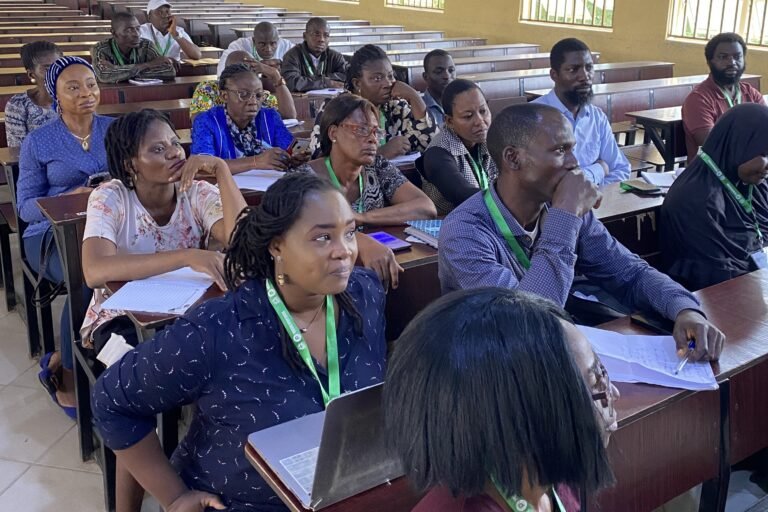
UNILAG, Nigeria
This July, we returned to our long-standing partners at the University of Lagos. We sent three volunteer professors from Africa and the United States. This programme included courses in faculty training and research methods, financial literacy, and the Nigerian economy in a global context.

Ecolotrip, Benin [FR]
In partnership with Ecolotrip, Prowibo sent our Francophone Africa Manager to deliver a course on social entrepreneurship and leadership. The June programme was incorporated to be part of Ecolotrip’s Ecoweek, a conference which brought together French-speaking climate activists and green entrepreneurs. We are delighted to expand our operations into Benin with a new partner as this aligns with our goals to work in more Francophone countries.

University of Kigali, Rwanda
This June, Prowibo partnered with the University of Kigali’s Department of Computer Science. Our volunteer professors delivered an intensive two-week hybrid course on Data Science and Law, seamlessly integrating these topics into a comprehensive lesson plan. This programme marked another new partnership and our first engagement in Rwanda.

MYCRO, Sierra Leone
Working with the Movement for Youth & Children’s Rights Organisation, we enhanced the skills of secondary school educators across Freetown, Sierra Leone, in June. Three of our volunteer professors from Belgium, Germany, and South Africa provided comprehensive training on data literacy, effective communication, the utilisation of online tools for educational excellence, and strategies for differentiation and personalisation in the classroom. We are thrilled to return to Sierra Leone, the country where we held our very first programme, after many years, and to partner with a new organisation.
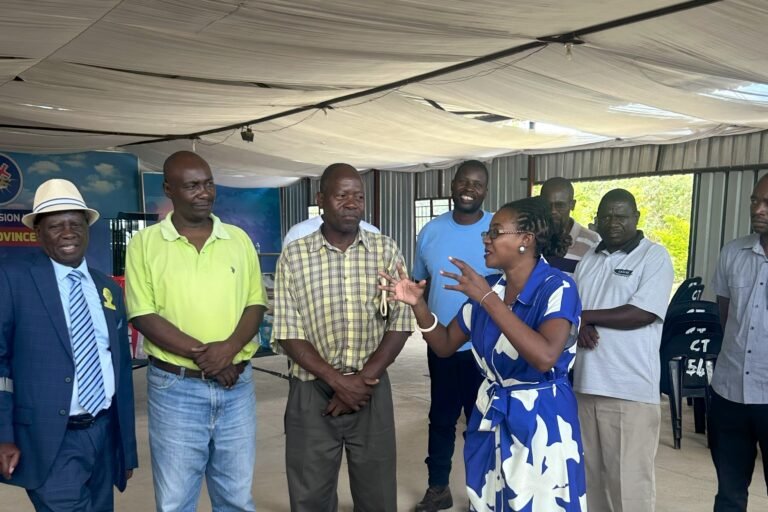
Africa Healing Foundation, Zimbabwe
Our first programme of 2024 was in collaboration with a former partner, the Africa Healing Foundation (AHF), but in a new country: Zimbabwe. A team of four volunteers spent a week in Harare teaching undergraduate students at the Women’s University in Africa and the Catholic University of Zimbabwe, as well as AHF volunteers. This programme focused on financial literacy, mental resilience, and career readiness to enhance the learners' confidence and preparedness for their future careers.
Our 2023 Programmes
See More

Maejo University, Thailand
Following a similar model to our programme at SWU, we conducted another project at Mae Jo University in Chiang Mai, Thailand. A thorough grasp of the Sustainable Development Goals (SDGs) is crucial for individuals to become proactive change-makers and promote sustainable development within their communities. The emphasis on SDGs was presented as a broader, international approach to learning, with a specific focus on environmental issues and equality.

Srinakharinwirot University, Thailand
Our intensive three-day program at Srinakharinwirot University in Bangkok, Thailand, centered around Sustainable Development Goals (SDGs). Participants acquired a comprehensive understanding of SDGs, along with essential skills such as analysis, presentation, group work, and personal reflection. In collaboration with our volunteer professors, the programme featured a guest session from the UNDP and included field trips into Bangkok city, providing participants with opportunities to apply their SDG knowledge and skills to benefit their community.

Africa Healing Foundation, Kenya
This early August programme was a series of workshops aimed to start to demystify and destigmatise mental health and well-being by opening discussions on stress, anxiety, and depression, while teaching techniques for stress management and building self confidence. Each day, the team worked with a different target group. In rural areas: unemployed youths aged 16-25; young people from 6- 16; and senior citizens. Prowibo worked with AHF to deliver a Stress Management and Mental Health Strategies workshop for faculty at the University of Nairobi.

URDT Girl’s School, Uganda
The URDT Girl’s School participants were taught how to effectively integrate technology in the classroom and streamline their own workflow through courses such as Integrating Technology in the Classroom and Teaching with Technology for Today and Tomorrow. 21st-century learning requires a comprehensive understanding of technology, in and out of the classroom, and the learners finished the programme with this knowledge.

African Rural University, Uganda
In August, Professors Without Borders revisited Uganda, where participants from Africa Rural University gained valuable insights into a new approach for generating "actionable" knowledge. This method equips communities with practical solutions to address their unique challenges. Moreover, these participants are now poised to become trainers on enhancing nutrition and overall health. The learning experiences were facilitated through specialised courses such as "Foundations of Participatory Action Research" and "From Farm to Table."
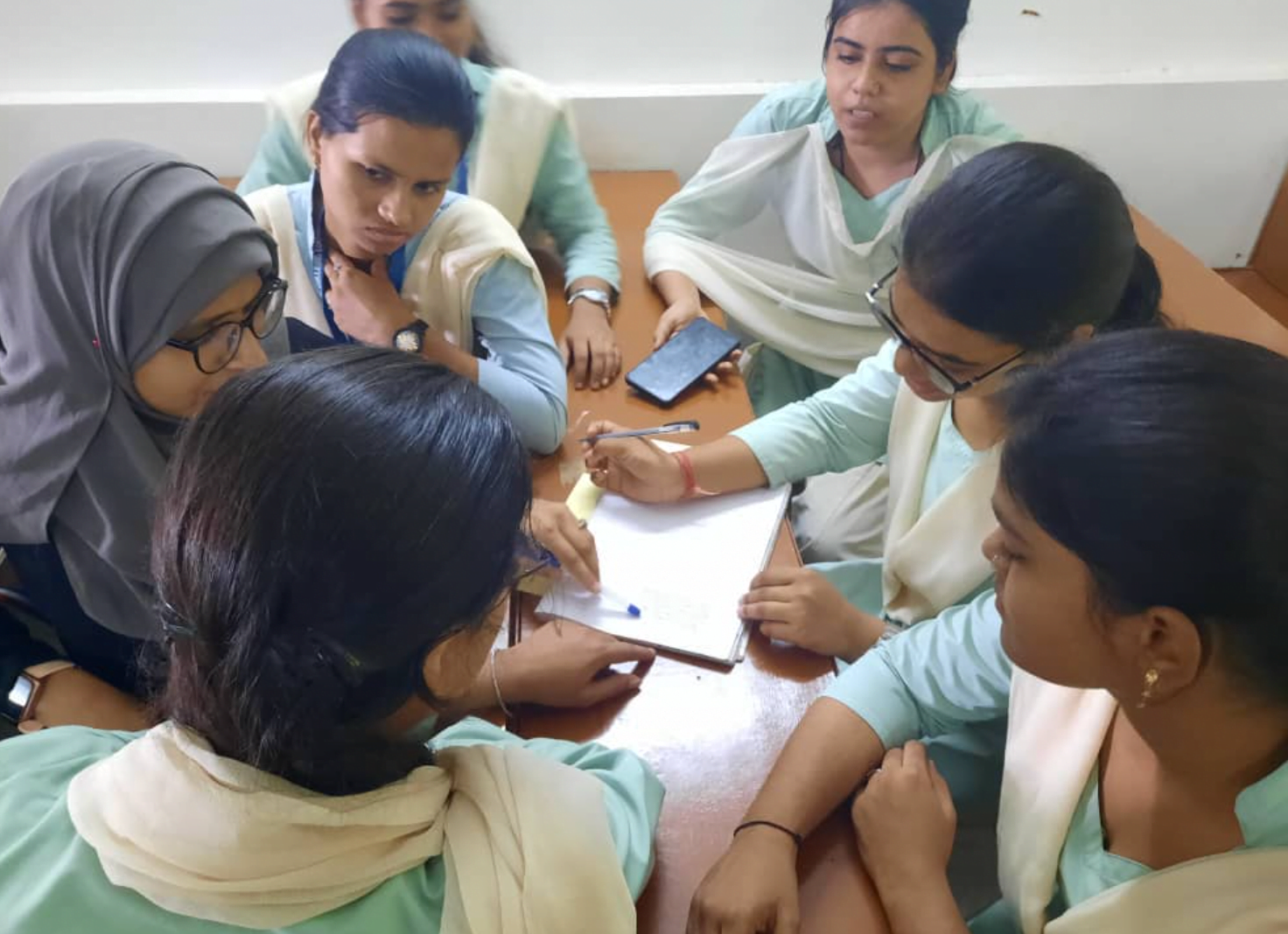
Karamat Girls PG College, India
Karamat Husain Muslim Girls P.G. College is one of our oldest partners which is why it is always an honour to return to Lucknow, India this August. This year two of our volunteer professors from Africa flew to India for a week long programme for female empowerment by developing the tools necessary for mental resilience and financial literacy, as well as exploring how gender equality manifests at the individual and collective levels, and the power and pathways for civil society to create gender equality .

Ekiti State University, Nigeria
Following our program in Lagos, the Nigeria team ventured up-country to Ado-Ekiti for our first-ever program at Ekiti State University (EKSU). This program followed suit as the previous one but with the special addition of a Finance for Africa course from one of our long-standing volunteers now based in Nigeria

University Of Lagos, Nigeria
This July, we delivered our second project at the University of Lagos (UNILAG). This program targeted two groups of learners: undergraduate students and the UNILAG faculty. The students were engaged in Sustainable Development, Financial Literacy, and Entrepreneurship courses. Meanwhile, the faculty explored the topic of inspirational leadership.
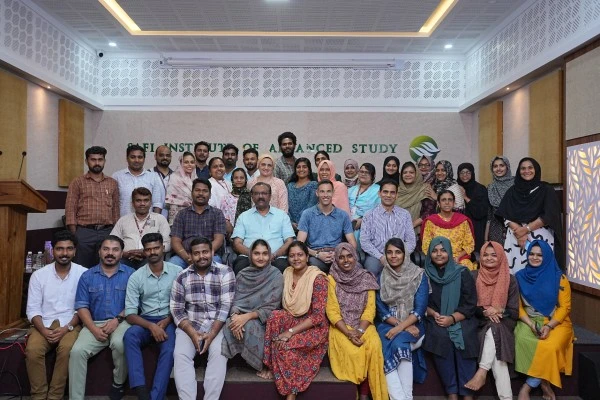
Social Advancement Foundation of India (SAFI), india
Also in May, we delivered a faculty development programme for our new partner in Kerala, the Social Advancement Foundation of India. The programme began with three weeks of online classes and culminated in a one-week in-person workshop series. Being an Inspiring Leader helped participants develop the interpersonal teaching skills they need to motivate and inspire students. The course covered the latest research in motivation, goal-setting theory, and pedagogical practices. The Online Curriculum Design course helped participants develop the skills they need to design and deliver online courses, using instructional design principles for remote teaching and learning and provided them with theoretical and practical knowledge.

Likusasa Letfu, Eswatini
In May, we launched our first programme in Eswatini with the locally-based non-profit to nurture young entrepreneurs. The programme targeted individuals aged 18-30 and focused on providing essential soft skills, communication, critical thinking, entrepreneurial thinking, financial literacy, and futures thinking. The programme empowered participants, reduced vulnerability, and promoted equity in their communities.

University of Johannesburg, South Africa
In March, we visited the University of Johannesburg to meet with students and educators in the Faculty of Humanities. The visit established a partnership between our Think Tank and UJ to foster collaboration in research, teaching, and learning. During the visit we delivered a workshop for humanities students entitled "The Basics: Building Your Network In A Complex World. Then in collaboration with the Teaching and Learning Committee we ran a faculty workshop under the theme "Higher Education Assessment Strategies in a Changing World.”
Our 2022 programmes
See More

Back to Basics, Kenya
In January, we launched the first part of our programmes with Back to Basics with an online programme on ‘Building Resilience and Mental Well-Being’. This was followed up by an in-person programme in Nairobi in March, that had classes on tackling hate speech, online security, and utilizing social media.
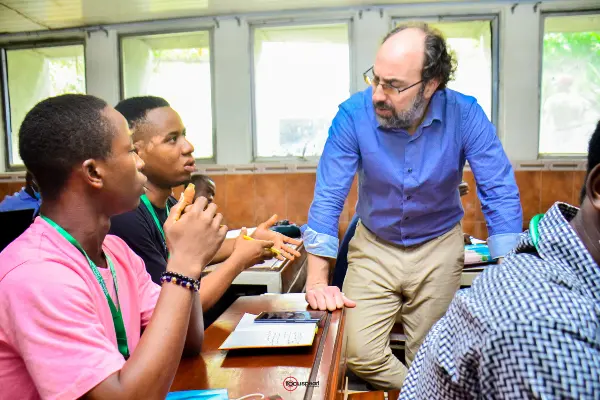
University of Lagos, Nigeria
In March, Prowibo started its first project in Nigeria with our partners at the University of Lagos, where we ran programmes for both students and faculty. Our programme for staff focused on the challenges and opportunities of 21st-century teaching, while our student programme had classes on African finance, financial literacy, personal branding, and entrepreneurship.

Srinakharinwirot University, Thailand
We ran an online programme on ‘21st Century Skills & the Sustainable Development Goals’ with our local partners in Thailand - Srinakharinwirot University. This included courses on futures literacy, design thinking and pitching.

Ministry of Youth and Sports, Guinea
Collaborating with the Guinean Ministry of Youth and Sport, we taught a Francophone programme on entrepreneurship and well-being to 50+ students. This included classes on presentation skills, working with small and medium businesses, and physical exercise sessions.
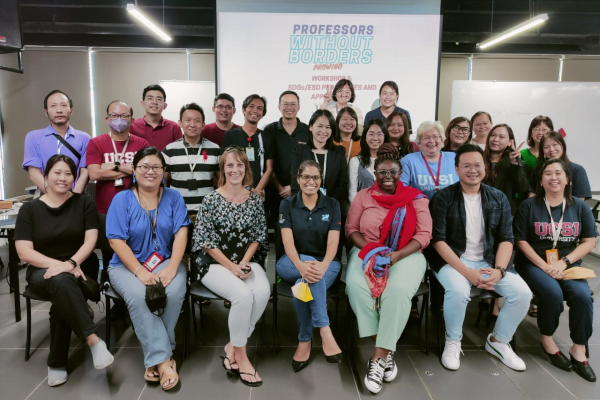
UCSI KL & Kuching, RCE Kuching, Malaysia
In May, our volunteers travelled to Malaysia to deliver programmes for students and faculty at UCSI KL & Kuching and RCE Kuching. Students undertook workshops on ‘Leadership and the SDGs’ and staff took part in our ‘Practical Strategies for ESD (Education for Sustainable Development)’ workshop. We also held a joint conference with UCSI University and the Regional Centre for Expertise on Education on “Science & Sustainable Development: Rebooting a Decade of Action with STEM Education” at UCSI University in Kuala Lumpur.
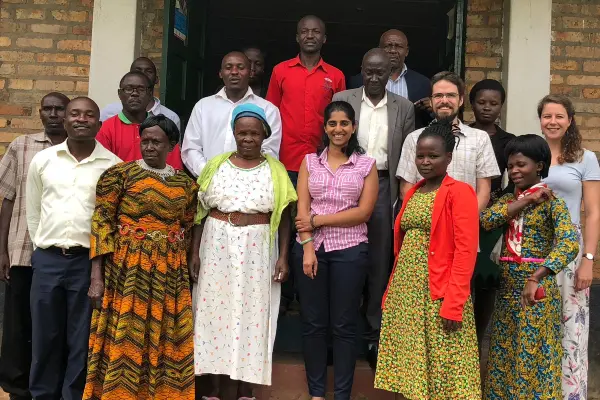
African Rural University & URDT Girls’ School, Uganda
In August, we returned to our long-standing partner, the African Rural University. On this visit, we held courses for women and faculty to develop their entrepreneurship, leadership and self-defence skills. We also launched a new programme at their sister primary/secondary school, URDT Girls’ School upskilling faculty to teach for the 21st century.
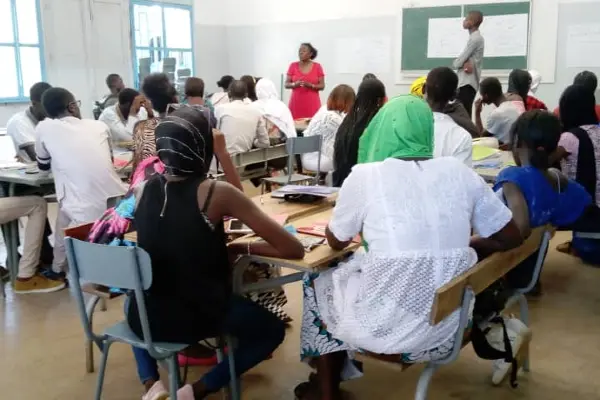
Le Réseau des Clubs Scientifiques du Sénégal (RCSS), Senegal
In August, we ran our second Francophone programme for 2022, visiting the RCSS in Senegal to teach a course on social entrepreneurship. In the second week, our ‘Act & Inspire’ programme taught a second group of 50 marginalised young people. The course explored leadership, empathy, collaboration, and social entrepreneurship.
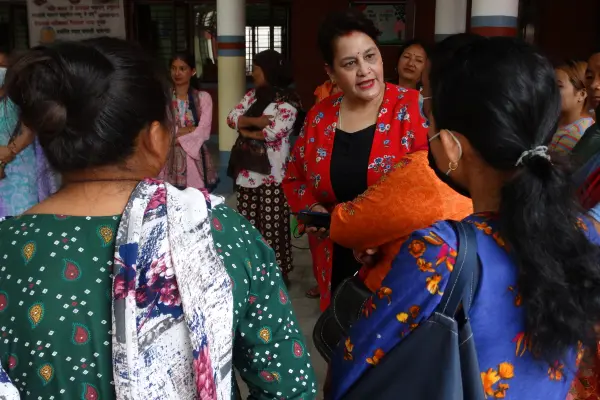
Institute for Integrated Development Studies (IIDS) & Zonta Club of Kathmandu, Nepal
In September, we ran our first programme in Nepal with the Institute for Integrated Development Studies (IIDS). Our two week programme featured courses on Circular Economy and Design Thinking, Sustainable Development, Inclusive Development Leadership and Communication and Confident Communications. The programme concluded with a roundtable discussion to evaluate the courses as well as share perspectives on the future of development politics and economics.
If you would like to support our work, please consider making a donation. Alternatively, for more information or to get involved – contact us.
